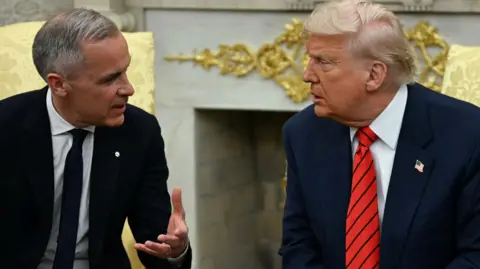In a significant development in international trade relations, US President Donald Trump has announced the immediate cessation of trade talks with Canada. This decision comes in response to Canada’s enforcement of a new tax policy aimed at major technology companies, which Trump has described as “egregious.” The announcement was made through social media on June 27, 2025, as both nations were engaged in ongoing discussions with the goal of finalizing a trade agreement by mid-July.
The backdrop to this abrupt termination is a turbulent trade relationship that has been overshadowed by tariffs imposed by both countries on each other’s goods. The trade conflict escalated earlier in the year, with Trump publicly threatening to use “economic force” to gain leverage over Canada. Consequently, both sides have implemented various tariffs, creating a framework of mutual economic pressure.
On Friday, Trump specifically referred to the newly instated Canadian digital services tax of 3% as a catalyst for his decision to end the discussions. He indicated that he would introduce new tariffs on goods crossing the US-Canada border within the upcoming week. This announcement signifies a marked shift in relations, suggesting a move away from negotiation and toward more punitive economic measures.
In his social media message, Trump declared, “We are hereby terminating ALL discussions on Trade with Canada, effective immediately.” He emphasized that Canada would soon receive detailed information regarding the new tariffs they would face when conducting business with the United States. This bold declaration not only underscores Trump’s tough stance but also raises questions about the future of bilateral trade between the two countries.
Since the law was enacted last year, the digital services tax has posed challenges to US-Canada relations, especially with payments set to commence shortly. Although the Canadian finance minister’s office confirmed the government’s intent to proceed with implementing the tax, they did not provide immediate commentary on Trump’s announcement. Business groups have expressed deep concern, estimating that this tax could impose over $2 billion in costs on American companies annually.
Looking ahead, Canadian officials have suggested their anticipation to address these trade concerns during discussions with the US. Interestingly, the recent emergence of Mark Carney, the newly elected Prime Minister of Canada, had initially instilled hope for a more productive dialogue between the two countries. Carney’s relationship with Trump had appeared to be warming, which many believed might facilitate smoother negotiations. However, the president’s recent pronouncement raises substantial doubts about the potential for future agreements.
In the context of the broader trade landscape, Trump’s tactics have often involved leveraging social media threats to motivate negotiations. For example, he previously warned about escalating tariffs on goods from the European Union, only to retract those threats shortly thereafter. Nonetheless, the termination of trade talks with Canada signifies a more serious commitment to taking a hard line than before.
Furthermore, the economic implications of this trade standoff are considerable, as the US remains Canada’s foremost trading partner, with transactions exceeding $400 billion in the prior year under a long-standing free trade arrangement. In previous interactions, Trump had placed a restrictive 25% tariff on Canadian imports, citing border security and drug trafficking as primary concerns. This move has further complicated trade relations, particularly in industries like automotive manufacturing, where parts frequently cross the US, Canadian, and Mexican borders multiple times during the assembly process.
As the situation evolves, economic observers have noted a decline in US stock prices following Trump’s announcement, reflecting investor anxiety over the potential fallout from this latest development. The broader repercussions of the halted trade negotiations could affect a variety of sectors, adding to the already complex tapestry of US-Canada economic relations. Ultimately, this unfolding narrative serves as a critical reminder of the precarious nature of international trade dynamics amidst shifting political landscapes.











